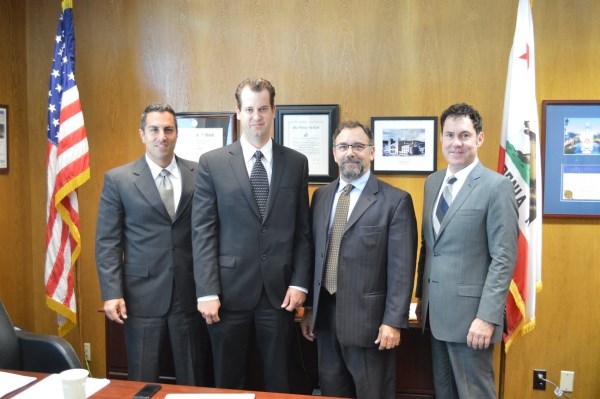Politics of Plating in California
California finishers converge on state capital.
Norm Plotkin and Bryan Leiker were handing out six-page spreadsheets to their assembled group of surface finishers on the steps of the California state capital building in Sacramento much like a head coach and offensive coordinator would do getting their team prepped for the big game.
Plotkin, the executive director of the Metal Finishing Association of Southern and Northern California, and Leiker, president of the MFASC chapter, were preparing to lead their teammates into a series of several dozen meetings and visits with their state senators and assemblymen to talk metal finishing and regulation.
For Leiker, Sales and Marketing Director at K&L Anodizing in Burbank, a third generation, family-owned business founded by his grandfather “Lefty” in 1950, it’s a matter of meeting state officials and building relationships.
“We want to build new relationships with the people at the statehouse and maintain the ones we already have,” he said. “The message we want to get across is that the surface finishing industry contributes $15 billion to the California economy, employs over a hundred thousand Californians and is very important to, among others, the aerospace and defense industry, which has again seen rapid growth in California.”
WATCH THE VIDEO
The annual Legislative Action Day for the California NASF chapters is not new, but the renewed commitment was evident in May when Plotkin led the group of a dozen or so platers and suppliers into the state capital to chat with senators and assemblymen in meetings that had been arranged several weeks and days prior to their arrival by the associations’ long time contract lobbyist, Jerry Desmond.
First, Plotkin met the previous evening with the group, including MFANC president Terry McGuiness, who also served to gather his northern brethren for the annual capital meetings. They planned their visits for the following day and talked strategy.
Plotkin had more than 20 years of legislative and advocacy experience, running a full-service lobbying, association management, government relations and communications firm based in Sacramento.
He also worked as a consultant for the California state assembly on both the insurance and health committees, a role that brought him close to the assemblymen and senators that he and the metal finishing groups were now lobbying.
Click below to view a slideshow of the images
“It’s my old stomping ground, so I kind of knew all the nooks and crannies of where everything was,” Plotkin said. “It’s always fun to go back and visit the people whom I’ve known for a long time.”
Leiker said he noticed a renewed energy level during this year’s visit with Plotkin at the helm, but the mission was still the same.
“You could sense that these state officials were really listening to what we had to say,” he said. “There was a lot more of a connection made this time around. The story we had to tell was being heard.”
One of those people Leiker was glad to sit down with was Assemblyman Mike Gatto, who represents the 43rd District where Leiker’s business is located. They spoke at length on issues facing not only the metal finishing industry, but also on business matters in general.
“That was an important meeting for me, personally, because he is my assemblyman,” Leiker said. “It’s important for both of us to put a name with a face. I want to build a solid working relationship with Mike going forward, he is a moderate, get things done legislator with a bright future.” “In fact, we have a planned shop tour with Mike in June,” Leiker continued.
Plotkin said the one day capital visit does not end the association’s lobbying efforts for the year. He said the group will continue to reach out to the senators and assembly members through their lobbyist who will attend hearings and conferences all throughout the year on matters that impact the finishing industry and the group will return to Sacramento if a policy issue arises that requires action.
“The message that was heard – and the one that we will continue to tell ‑ is that the finishing industry is so vital to other California industries such as aerospace, defense, tech, commercial and so many others,” Plotkin said. “Once we have made that connection with them on the importance of our industry to the entire state, the fact that metal finishing products are in literally everything, then we have made a big step in getting heard in the future. But we’ll work on this every day and every week from here on out.”
Related Content
NASF/AESF Foundation Research Project #122: Electrochemical Approaches to Treatment of PFAS in Plating Wastewater - 7th Quarterly Report
The NASF-AESF Foundation Research Board has selected a project on addressing the problem of PFAS and related chemicals in plating wastewater streams, studying PFAS destruction via electrooxidation and electrocoagulation. Our last report described the results from experiments of EO with a Magnéli phase Ti4O7 anode on the degradation of eight perfluoroalkyl acids (PFAAs). In this seven quarter report, we describe work to further explore how the degradation of different PFAAs are related to their molecular structures.
Read MoreNASF/AESF Foundation Research Project #121: Development of a Sustainability Metrics System and a Technical Solution Method for Sustainable Metal Finishing - 15th Quarterly Report
This NASF-AESF Foundation research project report covers the twelfth quarter of project work (October-December 2023) at Wayne State University in Detroit. In this period, our main effort focused on the development of a set of Digital Twins (DTs) using the Physics-Informed Neural Network (PINN) technology with application on parts rinsing simulation.
Read MoreNASF/AESF Foundation Research Project #122: Electrochemical Approaches to Treatment of PFAS in Plating Wastewater - 6th Quarterly Report
The NASF-AESF Foundation Research Board has selected a project on addressing the problem of PFAS and related chemicals in plating wastewater streams, studying PFAS destruction via electrooxidation and electrocoagulation. This sixth quarter report covers the continued assessment of eight perfluoroalkyl acids PFAAs most commonly found in wastewaters, by electro-oxidation with a Magnéli phase Ti4O7 anode across a range of anodic potentials in solutions, exploring the reaction mechanisms. To summarize, the PFAAs start to exhibit degradation behavior when the anodic potential reaches a level where water oxidation occurs, suggesting that the hydroxyl free radicals generated via water oxidation play a role in PFAA degradation.
Read MoreZinc Phosphate: Questions and Answers
Our experts share specific questions about zinc phosphate and pretreatment
Read MoreRead Next
Delivering Increased Benefits to Greenhouse Films
Baystar's Borstar technology is helping customers deliver better, more reliable production methods to greenhouse agriculture.
Read MoreA ‘Clean’ Agenda Offers Unique Presentations in Chicago
The 2024 Parts Cleaning Conference, co-located with the International Manufacturing Technology Show, includes presentations by several speakers who are new to the conference and topics that have not been covered in past editions of this event.
Read MoreEducation Bringing Cleaning to Machining
Debuting new speakers and cleaning technology content during this half-day workshop co-located with IMTS 2024.
Read More








.jpg;maxWidth=300;quality=90)
















